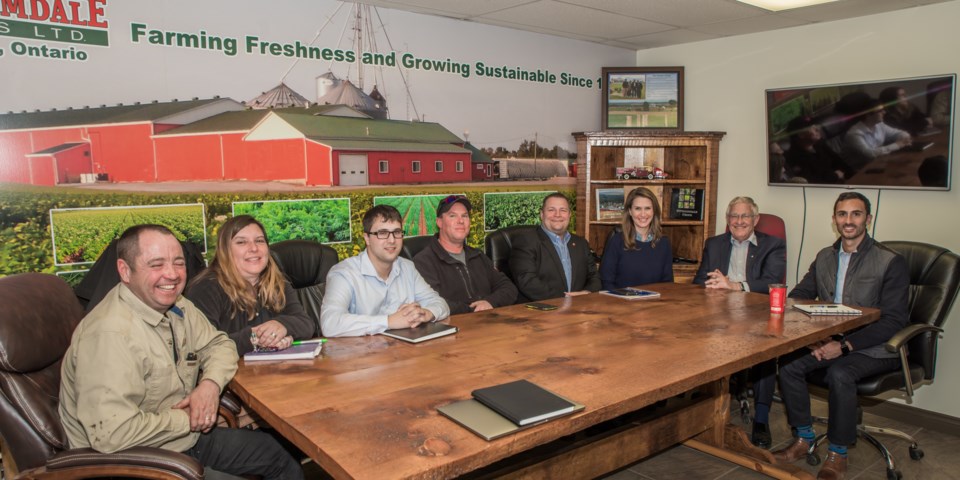Imagine owning a piece of agricultural land on which you want to build.
Before you can start, you have to follow regulations for six different organizations and get permits.
And, in the end, each organization maps your property differently, so some may not allow you to build at all.
This is the reality for some Holland Marsh farmers in Bradford West Gwillimbury.
“It’s negatively affecting the way they can operate,” said Quinton Woods, Gwillimdale Farm’s sales and operations manager and chair of the Holland Marsh Growers’ Association.
Woods recently arranged a visit to Gwillimdale Farms with members of the growers’ association, York-Simcoe MPP Caroline Mulroney, King-Vaughan MPP Stephen Lecce, and Minister of Agriculture, Food and Rural Affairs Ernie Hardeman to discuss how government can reduce red tape for farmers.
Woods said farmers needing to work with six organizations — municipality, province, conservation authority, greenbelt, Ministry of Natural Resources and Forestry, and the Greater Golden Horseshoe — for certain work on their properties was one of the issues brought up to the ministers.
That specific problem, he said, started in 2007, when the ministry gave conservation authorities the power to regulate the watershed. This resulted in some agricultural land being remapped as wetlands, which are protected.
So, while a municipality may have a piece of property zoned agricultural, for example, a conservation authority may have it listed as something else. Or, a property that was not previously regulated by a conservation authority may be now.
“Nobody’s right or wrong in this scenario,” Woods said, adding conservation authorities just want to protect the environment.
“The mapping’s not consistent. We just want a consistent layer across the province.”
Woods said the mapping issue can also pop up when farmers want to start farming grassy land on their properties, or when they want to clean up fence rows or brush.
“The Holland Marsh plays a significant role not only in feeding our communities, but in creating jobs and growing our economy,” said Mulroney.
“We need to work with our farming families, at all stages of the supply chain, to ensure that they have the support they need to succeed and thrive. A big part of that is listening to the industry regarding the challenges they’re facing, and the opportunities available to address them. ”
Jody Mott, executive director of the growers’ association, said some local farmers also struggle with getting permits to wash their crops and discharge that wash water because they are costly and take a long time to get.
It can also cost farmers $75,000 to $100,000 just to start an environmental assessment compliance process, she added.
Mott said she hopes the ministers will “revisit” these regulations, and that the meeting with them was “very, very positive.”
“The agricultural industry is sometimes treated like any other industry,” she said. “You have to cross a lot of other different ministries. It should be basically a one-stop shop.”
Woods said other issues brought up at the meeting include lack of infrastructure, such as high-speed Internet, soaring hydro rates, and access to electricity and natural gas.
“Our biggest competition … is Quebec. (They have) cheaper electricity, tax rates. We’re falling behind in competition to them,” he said, adding customers sometimes ask Ontario farmers to price match Quebec growers, which cuts into their profit margins.
Woods said no follow-up with the ministers has been planned, but he hopes they take local farmers’ concerns to heart when they sit down to write new policies.
“We are happy to be listening to the Holland Marsh Growers’ (Association) about how we can strengthen Ontario’s agriculture industry,” said Hardeman.
“Our government for the people knows that costly red tape and too many regulations are squeezing businesses in every sector, and driving jobs and investment out of Ontario. Reducing that burden is one of our government’s key goals.”



